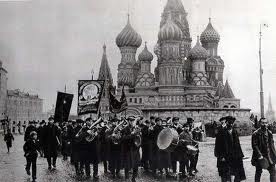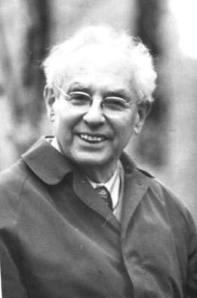It’s cold outside; Moscow in the 1920’s was not a happy place to be: Russia was still reeling from the bloody Bolshevik Revolution and Lenin had recently come to power. But for one newspaper reporter going about his normal work, life was about to change forever.
Newspaper reporter Solomon Shereshevskii was in trouble. His editor summoned him to his office to give him a grilling: “You never make notes! How can you expect to write good news?” As far as the editor was concerned, Solomon was a careless reporter who never used a notebook, and his editor wanted to correct his unprofessionalism. Solomon replied “I don’t need to write anything down because I never forget anything!” His editor thought he was joking, so he played along: “Ok Solomon, Tell me exactly what were you doing on January 17th at 2.10pm?” Solomon told him immediately and in precise detail: where he was, what the weather was, what was said and what people were wearing. Bemused, his editor continued to ask questions. But it wasn’t just that one date: Solomon could do the same for any date! The movie camera had only been created a few years previously but standing before the editor was a living-breathing video recorder!
Photographic memories
Occasionally you meet someone who claims to have a ‘photographic’ memory. They probably don’t. In reality, such abilities are extremely rare. Even the best memory experts use clever ‘tricks’ to help them: vivid mental imagery techniques and years of practice to remember long lists of bland facts and numbers. Solomon Shereshevskii however was the real McCoy: he had a truly ‘photographic memory’! He could do it all without even trying! Intrigued, the initially sceptical editor sent Solomon to see an expert neuropsychologist, Alexander Luria, to find out more…
On arrival, Alexander Luria set about giving Solomon memory tasks. For each test, Solomon would get full marks: Lists of numbers, dates, events, and complex mathematical formulae were no problem for Solomon. Luria tried harder tests, but bored Shereshevskii decided to show off by recalling the long lists of numbers forwards and then backwards! Determined to find Solomon’s limit, Luria set him a seemingly impossible task: memorise the entirety of Dante’s Inferno!
Incredibly Solomon obliged, and even though he couldn’t speak a word of Italian he was able to recall it word-for-word after just one sitting! Luria gave in and eventually decided that Solomon Shereshevskii’s memory had no limits.
Solomon Shereshevskii and his Amazing Memory
Solomon Shereshevskii had a rare medical condition that helped him to remember called ‘synaesthesia’: his brain was mis-wired and everything he experienced was turned into a vivid and unforgettable sensory experience. Similar to a drug-induced ‘acid-trip’ Solomon would actually ‘hear’ colours, ‘taste’ images and ‘see’ music. So to Solomon, even the most mundane event would have an unforgettably immersive and psychedelic quality.
Solomon eventually left his reporting job and started his own stage-show: ‘The man who can remember anything!” For a while he earned a living by touring the country performing amazing memory feats. His unique abilities were drawing in crowds and turning an unremarkable-looking man a celebrity! Eventually though fame came at a cost…
The Fall of Solomon
It should be amazing to be able to effortlessly commit everything to memory; imagine never again forgetting a Birthday, important meeting or an item on a shopping list! But for Solomon it ended up as a dreadful curse. He simply couldn’t forget! Forgetfulness seems to be important for an individual’s sanity, and it wasn’t long before Solomon’s mind became completely flooded with irrelevant facts. He started to find it difficult to know which facts were important and which were from his on-stage performances. Some of his vivid memories would also start to ‘spill out’ at unexpected times:
‘One time I went to buy some ice cream… I walked over to the vendor and asked her what kind of ice cream she had. ‘Fruit ice cream,’ she said. But she answered in such a tone that a whole pile of coals, of black cinders, came bursting out of her mouth, and I couldn’t bring myself to buy any ice cream after she had answered in that way …’ (Solomon Shereshevskii)
The benefits of forgetting
Solomon Shereshevskii’s story doesn’t have a Hollywood ending: Every day poor Solomon became more debilitated by his inability to forget. Unable to work out which memories were important and which weren’t Solomon was unable to see ‘the bigger picture’, Every new experience formed mental associations with dozens of other memories. Even the best medical experts of the time were unable to help: no-one could find the hunan video recorder’s stop button! Solomon Shereshevskii eventually became a social recluse; a bombardment of vivid and intrusive thoughts prevented him from thinking clearly. Unable to form meaningful relationships, Solomon sadly ended up a prisoner to his immense memory.
Being able to forget is definately a gift.
Memory Test
How good do you think your memory is? If you missed it first time round, you can check out my postings on what it’s like to lose your Memory, how your memory affects the decisions you make and take the memory test!
References:
Luria, A.R. (1968/1987). “The Mind of a Mnemonist: A Little Book About a Vast Memory.” Lynn Solotaroff, translator. Cambridge, MA: Harvard University Press.
Read Luria’s a translation “A Little Book about a Vast Memory” here












Discussion
Trackbacks/Pingbacks
Pingback: Open Laboratory 2010 - submissions now closed - see all the entries | A Blog Around The Clock - December 1, 2010